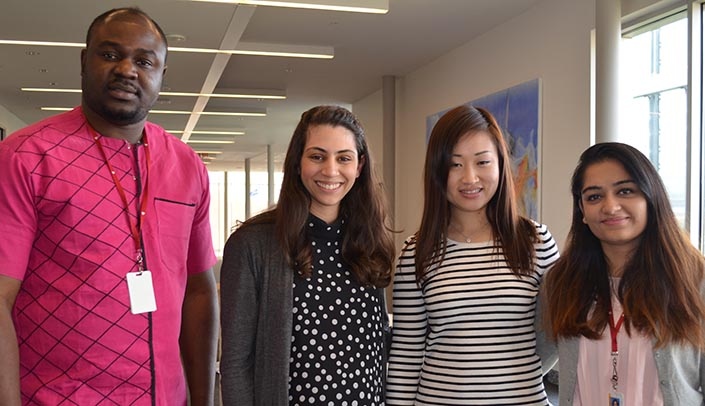They went to Syria, Tanzania and Taiwan to collaborate with local researchers and health care providers to address global population health issues that impact international communities.
New scholars announced
Three College of Public Health students have been awarded Suzanne and Ward Chambers Global Health Fellowships that will allow them to conduct four-to-six week intensive international research next summer.
The new scholars are:
- Rima Al Balushi, master’s student in epidemiology, will conduct a cost-benefit analysis of expanding breast cancer screening in Oman.
- Christopher Tougeron, master’s student in environmental and occupational health, will assess the ciliary function in traffic assistants and university students exposed to airborne particulates in Beijing, China.
- Zijian Qin, Ph.D. student in environmental, agricultural and occupational health, will assess particulate matter exposure to traffic assistants in China.
The four UNMC College of Public Health students spent last summer conducting four-to-six week intensive research thanks to Suzanne and Ward Chambers Global Health Fellowships.
Four fellowships are awarded every year to public health students who want to conduct health engagement projects or population health research overseas in qualified countries.
Ward Chambers, M.D., professor, health services research and administration, and his wife, Suzanne, established the fellowship to provide students an international research experience and to support advances and innovations in just and accessible care.
Students recently reported on their findings:
- Nada Alnaji, M.D., a Ph.D. student in epidemiology, partnered with Relief International-Jordan, to work with Syrian refugee women and children living in Syria. She studied the effects of child marriage and pregnancy-related complications on health. Although data was still being collected, Alnaji reported that teen mothers were more anemic and depressed, and their babies were more likely to be admitted to intensive care.
- Moses New-aaron, a master’s student in biostatistics, worked with researchers in Dodoma, Tanzania, at the Regional Referral Hospital’s Care and Treatment Center to analyze treatment for women who have HIV. As antiviral drugs prolong life, people with HIV begin to suffer from other chronic diseases. He established a research database to identify, describe and find patients, then track treatments, cancer screenings and follow-up care. Cervical cancer is the leading cause of cancer deaths among Tanzanian women. He found that young women were more likely to screen for cervical cancer and that more emphasis should be on screening awareness.
- Sachi Verma, a public health administration student, partnered with a physician in northern Tanzania to review the efficiency of their first responder system. Trauma is a major public health issue and a main cause of morbidity and mortality. Narrow streets and traffic congestion prevents firefighters, who were the only first responders, from reaching the scene of an accident. Recently, motorcycle taxi drivers were recruited as first responders, but there has been a high drop-out rate. Verma found that the drivers need follow-up training, where before there was none. She also helped them design a three-wheel ambulance that can easily navigate the streets.
- Xiaoting Sun, in her third year of Ph.D. work in health services research, administration and policy, used a longitudinal national health insurance research database in Taiwan to analyze the impact of 1-year post-discharge continuity of care (COC) on rehospitalizations. She worked with UNMC’s long-time collaborators at the National Taiwan University. Taiwan has mandatory single-payer health care coverage in which patients can self-refer to any physician or hospital. Sun found patients with higher COC in five conditions had lower all-cause rehospitalizations, but only those admitted for ambulatory care sensitive conditions had lower disease-specific rehospitalizations.
